Juli Angelis
Mia Vita Healing
Being late diagnosed as an autistic ADHD’er, I realise that my neurodivergent brain impacted my childless not by choice (CNBC) experience to a significant extent over the years. Being childless can often leave you wondering… “how did I get here?”, and discovering I’m neurodivergent provided some more missing pieces of the puzzle. Being a therapist myself, I’ve done a lot of inner reflection and personal healing over the years and I use my own personal insights, experience and knowledge in my own work too. There’s really so much I could say on this subject (one of these days perhaps I’ll get round to writing that book that many of us have stored inside of us), but for now I just thought l’d share some of my main reflections. Of course this isn’t to say that everyone who is neurodivergent and childless relates to all of these points; our experiences, personalities and circumstances, all shape who we are as individuals, and what may be true for me may not be the same for you and vice versa. However, just as with childlessness, there can be some common themes, so if any of these themes resonate with you, then know that you’re not alone on this journey.
Feeling different
It can be a common experience to feel different, or like the odd one out when you’re childless in a pro-natalist society and when everybody else seems to have children (or may be happily childfree). I now know that these feelings were likely exacerbated by also being neurodivergent. Since I was a child I always felt that there was something “wrong” or “different” about me. I always felt that I didn’t quite “fit in” and couldn’t understand how people managed life day-to-day, seemingly riding the ups and downs that life brings, socialising, dating, dealing with adult stuff and taking it all in their stride. Having received several different mental health diagnoses over the years and feeling like an incorrect jigsaw puzzle piece that couldn’t quite fit in with everything going on around me, I eternally felt like there was something fundamentally “wrong” with me. This subsequently also led to feelings of shame, which again is a common experience amongst childless women. Understanding this correlation, it finally made sense why I felt this so very deeply for so many years.
RSD
Following on from feeling like the “odd one out”, RSD (Rejection, Sensitivity Dysphoria) is experienced by many autistic people and ADHD’ers, and is characterised by intense feelings of emotional pain as a result of real or perceived rejection or a sense of failure. Reflecting on how this tied in to my CNBC experience, I realised this probably contributed to an extra sting in the tail over the years; social exclusion as a result can be a common experience, as well as the sense of “failing as a woman” as it were. After my own journey of healing work and acceptance, RSD isn’t something that I’m affected by anymore, especially now that I realise the impacts of this were also heightened due to ASD/ADHD.
Burnout & Task Paralysis
Feeling burnt out can be a common experience amongst neurodivergents and can last anything from days, to weeks, to months. Combined with ADHD paralysis (sometimes referred to as “task inertia” in autistic people), and in particular, if you also have a PDA autistic profile as I do, this can render you feeling completely disabled for lengthy periods of time, unable to leave the house or sofa or literally do anything! This state of paralysis has been a common theme throughout my life, even as a child, and I realise how much that has impacted me, especially when I was in the depths of childless grief and wanting to somehow create a life for myself; perhaps go to the gym, go for a walk, or get into some kind of a routine, meet up with friends or even attend community events. Often, I would find myself feeling paralysed and unable to stick to any types of plans or routines, which could also impact feelings of aloneness, also a common experience amongst us childless people (in particular before finding community). Combine burnout and paralysis with a dose of profound childless grief and endometriosis fatigue and you have the perfect recipe for feeling - and remaining - isolated. Add rumination to the mix, and you can find yourself in a downward spiral that feels difficult to get out of….
Rumination
Rumination, including anger, rumination, whereby someone may ruminate or obsess over frustrating or upsetting experiences, and regrets or past mistakes, can be common in autistic and ADHD brains and can exacerbate PTSD symptoms too. Discovering this gave me enormous insight as to why I found it so hard to “just move on” or not dwell on my childless circumstances and the factors that led me there. I’ve never been a believer in toxic positivity anyway, as allowing yourself to sit in the grief and process past traumas is a necessary part of healing…..however, with a brain that insists on ruminating and obsessing over upsetting circumstances, I do believe it took a lot of extra effort to somehow move forward with my life again. Partnered with rumination is also the neurodivergent ability to easily catastrophise, often leaving you imagining the worst scenario; hardly beneficial when you’re working through childlessness, and trying to imagine your future without children! A sense of a “foreshortened future” can also be true for trauma survivors, including those that experience childlessness, whereby it can be very difficult to visualise a future of any kind at all, let alone a positive one.
Hyperfixation & Special Interests
I know I’ve mentioned the detrimental impacts, however, there have also been positive factors too! On the flipside of rumination, a neurodivergent brain can possess the ability to hyperfocus and hyperfixate on subjects of interest - from an autistic perspective, these are referred to as “special interests”. Childlessness itself became a special interest of mine, and this led to me signing up for a Psychology MSc, specifically so I could go on to do a masters dissertation about the impacts of involuntary childlessness…all my ruminations surrounding childlessness were transformed into a special interest. This meant I spent hours, weeks and months endlessly researching childlessness and writing my dissertation (in fact, jobs involving research are sometimes recommended for autistics). All the hard work paid off, and I was delighted to receive a Distinction grade – something I never imagined possible!
Other reflections include:
The revelation that neurodivergent brains are often associated with a strong sense of social justice; this has certainly come in useful with regards to ongoing activism surrounding childlessness and finding my own voice several years ago, which was a key part in my healing journey. This also spurred on my desire to get my dissertation done.
Emotional dysregulation and meltdowns can be a common neurodivergent experience – needless to say in the depths of childless grief and feeling frustrated this added factor wasn’t helpful!
Hypersensitivity – refer to above!
Learning about my neurodivergent brain enabled me to seek new self-help tools adapted to my needs, and ultimately moved my healing journey forwards. In between my own therapy sessions, I also set myself some rules during my journey of neurodivergence acceptance as a childless person:
1. Turning special interests and a sense of social justice into purpose and meaning.
2. Remembering the mantra: “you did the best you could at the time with the resources that you had” when ruminating on all the ifs, buts and whys.
3. Getting rid of burnout guilt. Sometimes you may need to just stay in bed and rest and that’s FINE.
4. Embracing diversity and accepting your uniqueness. Easier said than done, but start with the small stuff. Pick out the things you like about yourself that make you different and embrace them.
5. When you’re emotionally dysregulated do the breathing, do the self-care, visualise a “safe place”, take some time out. Remember this will pass.
Whilst I’ll always be childless AND neurodivergent, learning about the ins and outs of the neurodivergent brain and how it can impact the childless experience, has been a fascinating journey of self-discovery and perhaps one of the last pieces of the jigsaw puzzle I felt was missing for many years. It has also provided deep insight in my own work day to day and added an extra perspective to the overall childless experience. I wouldn’t change my neurodivergence for the world, and despite the downs there have been plenty of ups too, for which I’m truly thankful.


